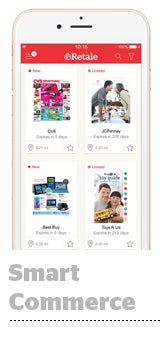 Ten years ago Axel Springer was a classic print publisher. About 1% of its revenue came from digital. These days, digital revenue tops 70%.
Ten years ago Axel Springer was a classic print publisher. About 1% of its revenue came from digital. These days, digital revenue tops 70%.
It’s been part of what Axel Springer US president Jens Müffelmann calls “a radical transformation” for the German publisher and it was triggered by an unlikely source – circular advertising, long the purview of print.
Circulars represent a multi-billion dollar market in Germany alone. Axel Springer was making around $100 million a year off of circulars – none of which was digital revenue.
That’s why Axel Springer helped spearhead the 2013 launch of German-based Retale, a location-based app that aggregates offline flyers, coupons and catalogs. Axel Springer is a majority investor in Retale’s parent company, Bonial.
When Retale – which now has relationships with hundreds of retailers across the US, including Walmart, Target and Macy’s – first entered the States roughly two years ago, retailers were primed and ready to embrace the concept, said Pat Dermody, president of Retale US.
“They were actively aware of the need to abandon or at least reduce their dependence on print circulars,” Dermody said, noting that some retailers have started moving beyond digitizing existing circulars to creating custom content just for the app.
Retale sits on a trove of intent data, but it purposely doesn’t collect personally identifiable information largely because of the company’s roots in Germany, where sensitivities around privacy are particularly acute.
However, when users sign up for the app they’re required to select or “favorite” the retailers they’re interested in seeing content from before they can take advantage of the service, which is a strong signal in and of itself. But retailers only have to pay on a CPE basis when users actually engage with the content.
Although Retale doesn’t know if a specific person made a purchase, it does work with location analytics company Placed for attribution to correlate behavior in the mobile app with transactional events using third-party data and loyalty card information. Retale has been able to calculate an incremental sales lift across categories of around 160%.
Axel Springer plans to keep investing in the platform and stay “aggressive” on the mobile front, Müffelmann said.
“Ecommerce is real, but the shift we’re all experiencing, especially in the US, is the tremendous momentum around mobile as a lifestyle tool, not just as a form of communication,” he said.
That said, mobile isn’t going to kill brick and mortar. Neither will ecommerce. It’s about developing an omnichannel infrastructure that meets whatever need the customer throws at it.
“Brick and mortar isn’t going away, but retailers do know they have to change because you can’t control every transaction inside the store,” Dermody said. “As a client once said to me, ‘I don’t care what channel a person buys from as long as they buy from us.’”














